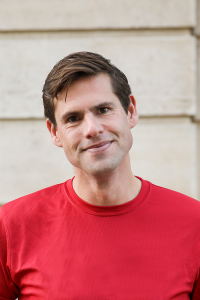By Vikki McCann-Rogers, Communications Officer
This Friday (1 July) is 50 years since the very first Pride march in London. 2,000 people took part. Now, more than one million people take London’s city streets to celebrate, and Pride events take place all over the world. To mark the occasion, I spoke to our Chief Operating Officer, Robert Kerse, about his very first Pride.
 What do you remember about your first Pride march?
What do you remember about your first Pride march?
It was a mixture of being really life-affirming, because there were lots of other people like me, but I was apprehensive as well. I just didn’t know what to expect. I went to the Brighton and the Manchester ones about a week apart and I finally felt a sense of belonging.
I’ve been to Pride in London about five years in a row, and Bristol Pride whenever I’ve been here. I’ll be at the Bristol Pride event this year with my husband and our dogs.
We’ve clearly made incredible progress through the years. How important is it that we still celebrate pride today?
I think it’s hugely important for two reasons. Firstly, it’s still not always easy for everyone come out. So, it’s important for those people to see others like them, from different walks of life, and different identities. Secondly, some parts of our community are hugely privileged in this country. That’s certainly not the case for all of our community or LGBTQ+ people in other parts of the world, including countries not far away from here.
Pride started as a real protest movement – do we still have a fight on our hands?
I think we do have a fight on our hands for parts of our community, yes. And I think if you are privileged enough to be able to be out and safe, then that gives us a huge obligation in terms of fighting on behalf of others. That’s what people did before us, to give us the position that we have now. So yes, I feel a big responsibility
Do you feel a responsibility to be a role model here at the University too?
I do, and it’s something I need to be continually conscious of. You never quite know who in the room might be trying to find some kind of affinity with you or is making their own decisions about themselves or somebody close to them.
So yes, it is incredibly important. There will be people in our community who are not yet out; who perhaps are not in the kind of circumstance where they feel they’d be accepted; who maybe fear loss or hardship if they did come out. What we can do through role modelling is really important – it can give people hope.
Do you think being gay has had any impact on your work or on your career?
Sometimes people don’t know how to take me when they first meet me, but I think I’ve become less conscious of that over the years.
I also think people sometimes make a special effort to acknowledge my sexuality for whatever reason. I’m always quite touched by that.
However, personally – given I’m a middle class, Oxbridge educated white male – the fact that I don’t tick the heterosexual box can take some of those edges off. A sort of leveller in some ways. I think because I’ve had the challenges of coming out the world is not as black and white for me as it might have been had I not been gay. That kind of struggle and difference helps me to be more empathetic with other people than I might have otherwise been.
I remember realising as a gay woman in my 20s that you don’t just ‘come out’, you have to keep doing it. Every time you meet someone new, or start a new job. Do you think that’s still as relevant now?
I think it’s still hugely relevant, but I’d hope the world is different than when I came out 20 years ago; I think certainly as a gay man it is much easier now. For other parts of the Community, there’s still quite a long way to go, I think.
When I first came out though – which does seem like a long time ago – I was pretty blessed by both my family and friends. A lot of people were very surprised though.
If I’m honest, I would say I still get a bit nervous about it in some circumstances, because everybody wants to be accepted and not singled out or identified for their sexuality.
What else can we do to help people feel they can bring their whole selves to work?
I think it’s talking about difference, whatever that difference is. I’ve always found any kind of equality, diversity and inclusion training I’ve undertaken where people tell you face to face what life’s like and challenge your preconceptions the most valuable.
We’ve done this previously with our frontline colleagues and our trans students. Experiential training is really, really important. You can’t ever walk in somebody else’s shoes, but the closer we can get to giving people access to those experiences, the better.
I’m looking forward to seeing you at Pride on 9 July and marching together as a Bristol community.
Me too. For me personally, I feel it’s really important to be with colleagues and students at such an important event for our community; but also to remind myself of everything that’s happened before us. The people who have paved the way. And the fact that there is still much more to do.
Of course, it’s always a really good atmosphere as well. An incredible buzz of so many LGBTQ+ people and supporters altogether. Whether it’s your first, tenth or even your fiftieth Pride – come and join us; come and march with us; and join an incredibly important party.

